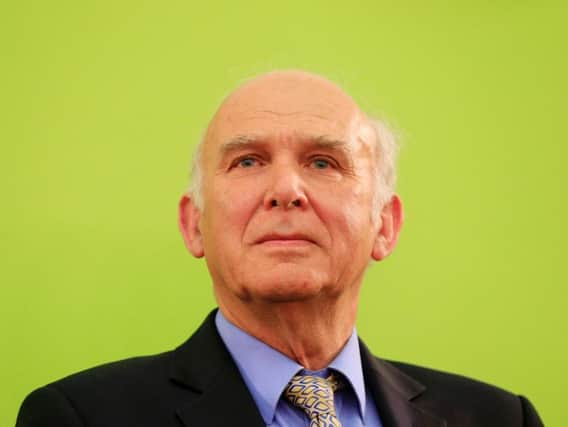Vince Cable: Tata's demands on steel and his haggling with the Treasury


The former Business Secretary has also admitted that steel giant Tata had asked the Government for a specific strategy for their industry back in 2012, but it wasn't deemed necessary.
He said despite ex-Tata CEO Karl Koehler's request, the Department for Business, Innovation and Skills instead chose to focus on ways to help the sector with compensation for company's that use high amounts of energy.
Advertisement
Hide AdAdvertisement
Hide AdHowever the high profile Lib Dem, who lost his seat at the General Election, accused the Treasury of 'dragging its feet' over ensuring the compensation pay outs were high enough and had to haggle with the department regularly to get money diverted to the steel industry.
Repeated calls to Chancellor George Osborne for business rate reform for the manufacturing industry also fell on deaf ears.
He described the SSI plant at Redcar as always being 'on the edge' and knowing of Tata's plans to sell Scunthorpe site back well before the May election.
Referring to the Coalition's industrial strategy document written in 2012, Mr Cable said: "We had 12 to 13 sectors that we looked at and we didn't specifically have a sector for steel. Mr Karl Koehler, who was the CEO of Tata did want separate industrial strategy on foundation industries, of which steel was an important one. and we did debate with the industry whether it was useful to proceed in that way.
Advertisement
Hide AdAdvertisement
Hide Ad"[Instead] we concentrated on one or two particular issues, which were getting compensation for their high energy costs. I was completely in favour of steel being a priority area within the industrial strategy but the problem was, which was the best way that we could help [Koehler].
"There were various other sectors that weren't mentioned at the time. Chemicals wasn't one of the core sectors but they developed their own industrial strategy. Creative industries, one of our more successful sectors, wasn't one of the original groups so we did this on a very pragmatic basis."
But the former MP for Twickenham said he regrets not using his 40 page Industrial Strategy: UK Sector Analysis not to pressure for more focus on public procurement.
He said: "One thing it didn't do was focus more on issues around procurement. Companies were putting up wind-farms across Britain and we had to bring parts from Europe past steel factories in the UK and that was almost insulting.
Advertisement
Hide AdAdvertisement
Hide Ad"I did tackle company Dong Energy and they did agree to start looking more closely on UK steel production."
Tory grandee Michael Heseltine, who was based in the Business, Innovation and Skills Department at the time, and Prime Minister David Cameron, enthusiastically endorsed the 2012 industrial plan which hasn't been updated since, and described construction and the automotive industry as beacons of future UK growth.
But despite the buy-in from the very top of the political elite, Mr Cable said the biggest hurdle was getting Treasury support for the steel industry as the Parliament progressed.
They were 'always dragging its feet' when it came to providing substantial amounts of money for the industry to help them meet energy costs, he said.
Advertisement
Hide AdAdvertisement
Hide AdPublic spending cuts meant the Department for Business, Innovation and Skills requests for compensation was repeatedly dismissed and a smaller settlement offered instead.
The York-born former Secretary of State said: "They were very reluctant to agree to substantial compensation for energy costs. That wasn't party political, that was the Treasury being the Treasury and not wanting to spend money."
Compensation for energy intensive industries was awarded in 2012 after Mr Cable requested EU state aid. Some of that money arrived in 2014, but he said he was alarmed to learn some of it still hasn't been paid out to companies nearly two years on.
He said: "I directed my energies to seeking state aid approval which came through and started payments to the companies. One thing that is very unsatisfactory is that we got approval quite a bit of time ago.
Advertisement
Hide AdAdvertisement
Hide Ad"When we agreed the policy of compensation, the Treasury were dragging their feet. They were reluctant to be generous and pay that quickly because of their concerns over public spending.
"BIS has to apply for the compensation money from the Treasury and they will haggle and say if you want to spend money on the steel industry, it's going to be taken off universities or colleges, so you will have a bitter argument with the Treasury about getting money."
He said while the Liberal Democrats in Coalition would have liked to offset the full cost of energy bills at steel plants, the 'Treasury weren't having that' so the department had to settle for a lower figure each time they were around the negotiating table.
This meant UK based steel companies were paying more for their energy than in other countries, he said.
Advertisement
Hide AdAdvertisement
Hide AdA Treasury source said: “Vince Cable’s version of events is completely but predictably inaccurate. We spent much of the time in coalition seeking to prevent the Liberal Democrats loading businesses with more green taxes.“Instead, we’ve been taking action to provide compensation for the industry’s energy costs since 2013 and the Chancellor announced more help, worth hundreds of millions of pounds, last autumn.“The government has always been clear that the steel industry is vital to the UK and we are doing everything we can to help secure a long-term, viable future. To suggest otherwise completely misrepresents the action we have taken to date to support the industry in the face of unparalleled global economic conditions.”